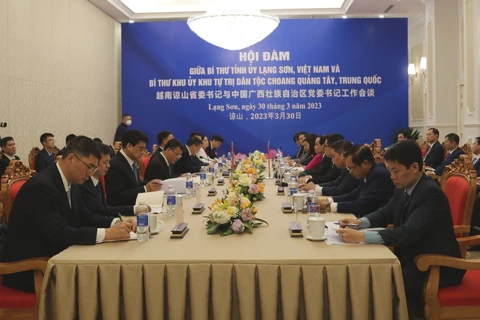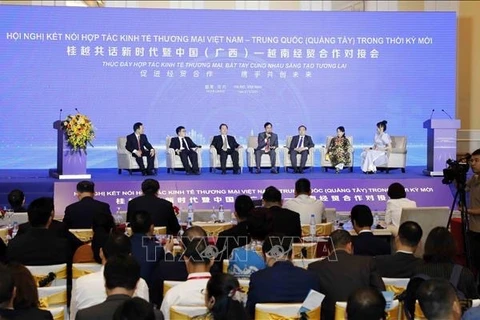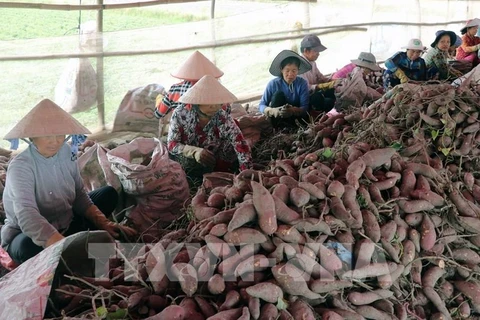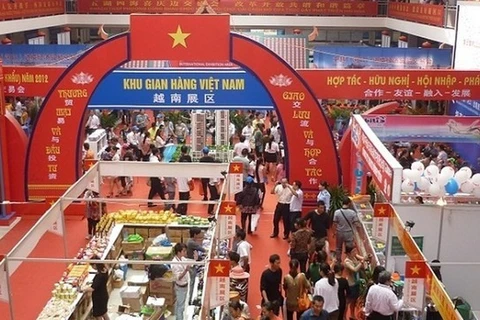Hanoi (VNS/VNA) - Vietnam's agricultural product exports to China are facing increasing difficulties due to tightening export requirements, according to the Ministry of Agriculture and Rural Development (MARD).
According to Minister of Agriculture and Rural Development Le Minh Hoan, China is no longer an easy market due to increasingly stricter regulations to protect consumers' health.
The standard of living is also increasing, meaning Vietnam's enterprises cannot maintain old production and business methods for farm produce exported to China.
MARD has proposed to strengthen the update of legal provisions on food safety and propaganda on safe food production according to regulations and requirements of Vietnam and China.
Order 248, regarding "Regulations on the registration of enterprises producing imported foreign food", and Order 249, on "Measures to manage import and export food safety", of China took effect from January 1, 2022.
The ministry will strictly supervise, inspect and follow up with enterprises according to the regulations on ensuring food safety in Vietnam and China. It will also strictly handle violations of food safety.
Tran Thi Bich Ngoc, head of Mong Cai International Border Gate Management Board, said to promote Vietnam's agricultural exports to China, enterprises needed to change further thinking, management, production and business methods.
The enterprises should constantly improve the quality of goods from farming, catching, processing, packaging and transport for the export products, Ngoc said.
They must accelerate the change of production methods towards safety, having specific standards, farming process management, and meeting China's requirements.
She said they also needed to actively strengthen linkages between manufacturers and exporters to exploit this market.
Nguyen Thi Thanh Thu, Chairwoman of Bagico Joint Stock Company in Bac Giang province, said Vietnamese agricultural products must overcome fierce competition when penetrating deeply into the Chinese market.
For example, Vietnam's durian products would have to compete with those from Thailand.
In addition, in the past, Vietnam only had to compete with border traders. Now, Vietnamese agricultural products would have to compete directly with official importers and corporations with a lot of money.
Despite having experience in doing business with the Chinese market for five years, Nguyen Duc Hung, Director of Hoan Cau Import and Export Joint Stock Company, said it was quite difficult to export goods to China because this market had constantly amended the Food Safety Law.
Chinese partners often make sudden change announcements, making many businesses passive in the preparation stage, especially for the businesses newly doing business with China.
A representative of Phuong Anh Seafood Joint Stock Company in Mong Cai vity, Quang Ninh province, said that it had been importing and exporting agricultural, forestry and aquatic products to China for more than 20 years.
However, since the beginning of 2023, the company had not been allowed to export raw oysters to China, without a reason. It hoped that the relevant authorities of the two countries would have more specific guidance on processes, regulations and conditions for import and export enterprises.
In the cassava industry, Nghiem Minh Tien, Permanent Vice Chairman of the Vietnam Cassava Association, said that every year, Vietnam had exported more than 3 million tonnes of cassava starch products to China, mainly unofficial exports.
To facilitate the exports, Tien said it was necessary to have stability in border trade policies.
"If there is a change, it also needs a reasonable adjustment time for enterprises to avoid sudden changes, causing great losses to the production and business of enterprises."
The Ministry of Industry and Trade said that Vietnam would gradually shift from an unofficial to an official quota in border trade activities to overcome the congestion of agricultural products at the border gate.
According to the draft on amending Decree 14/2018 on border trade activities, the ministry proposes to reduce exports under the unofficial category from January 1, 2025. The unofficial exports will need to meet stricter quality and traceability standards.
From 2028, goods will only be exported via land borders under official quotas./.
According to Minister of Agriculture and Rural Development Le Minh Hoan, China is no longer an easy market due to increasingly stricter regulations to protect consumers' health.
The standard of living is also increasing, meaning Vietnam's enterprises cannot maintain old production and business methods for farm produce exported to China.
MARD has proposed to strengthen the update of legal provisions on food safety and propaganda on safe food production according to regulations and requirements of Vietnam and China.
Order 248, regarding "Regulations on the registration of enterprises producing imported foreign food", and Order 249, on "Measures to manage import and export food safety", of China took effect from January 1, 2022.
The ministry will strictly supervise, inspect and follow up with enterprises according to the regulations on ensuring food safety in Vietnam and China. It will also strictly handle violations of food safety.
Tran Thi Bich Ngoc, head of Mong Cai International Border Gate Management Board, said to promote Vietnam's agricultural exports to China, enterprises needed to change further thinking, management, production and business methods.
The enterprises should constantly improve the quality of goods from farming, catching, processing, packaging and transport for the export products, Ngoc said.
They must accelerate the change of production methods towards safety, having specific standards, farming process management, and meeting China's requirements.
She said they also needed to actively strengthen linkages between manufacturers and exporters to exploit this market.
Nguyen Thi Thanh Thu, Chairwoman of Bagico Joint Stock Company in Bac Giang province, said Vietnamese agricultural products must overcome fierce competition when penetrating deeply into the Chinese market.
For example, Vietnam's durian products would have to compete with those from Thailand.
In addition, in the past, Vietnam only had to compete with border traders. Now, Vietnamese agricultural products would have to compete directly with official importers and corporations with a lot of money.
Despite having experience in doing business with the Chinese market for five years, Nguyen Duc Hung, Director of Hoan Cau Import and Export Joint Stock Company, said it was quite difficult to export goods to China because this market had constantly amended the Food Safety Law.
Chinese partners often make sudden change announcements, making many businesses passive in the preparation stage, especially for the businesses newly doing business with China.
A representative of Phuong Anh Seafood Joint Stock Company in Mong Cai vity, Quang Ninh province, said that it had been importing and exporting agricultural, forestry and aquatic products to China for more than 20 years.
However, since the beginning of 2023, the company had not been allowed to export raw oysters to China, without a reason. It hoped that the relevant authorities of the two countries would have more specific guidance on processes, regulations and conditions for import and export enterprises.
In the cassava industry, Nghiem Minh Tien, Permanent Vice Chairman of the Vietnam Cassava Association, said that every year, Vietnam had exported more than 3 million tonnes of cassava starch products to China, mainly unofficial exports.
To facilitate the exports, Tien said it was necessary to have stability in border trade policies.
"If there is a change, it also needs a reasonable adjustment time for enterprises to avoid sudden changes, causing great losses to the production and business of enterprises."
The Ministry of Industry and Trade said that Vietnam would gradually shift from an unofficial to an official quota in border trade activities to overcome the congestion of agricultural products at the border gate.
According to the draft on amending Decree 14/2018 on border trade activities, the ministry proposes to reduce exports under the unofficial category from January 1, 2025. The unofficial exports will need to meet stricter quality and traceability standards.
From 2028, goods will only be exported via land borders under official quotas./.
VNA
























